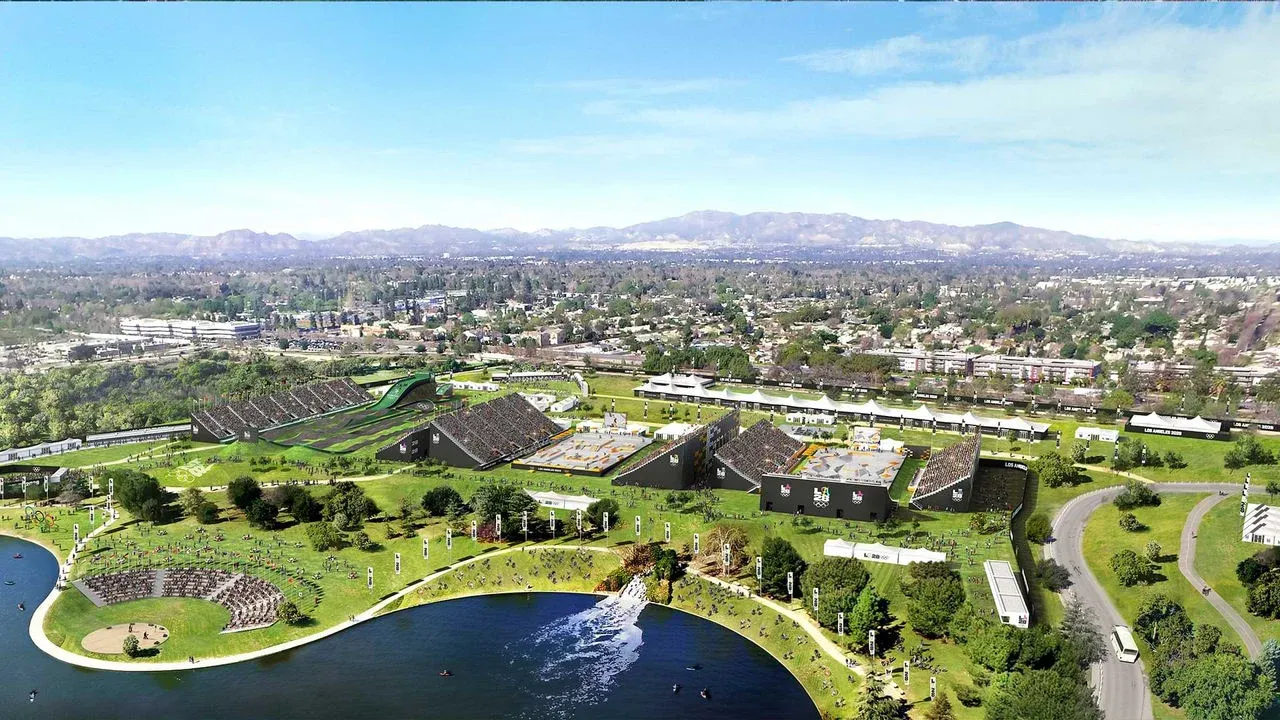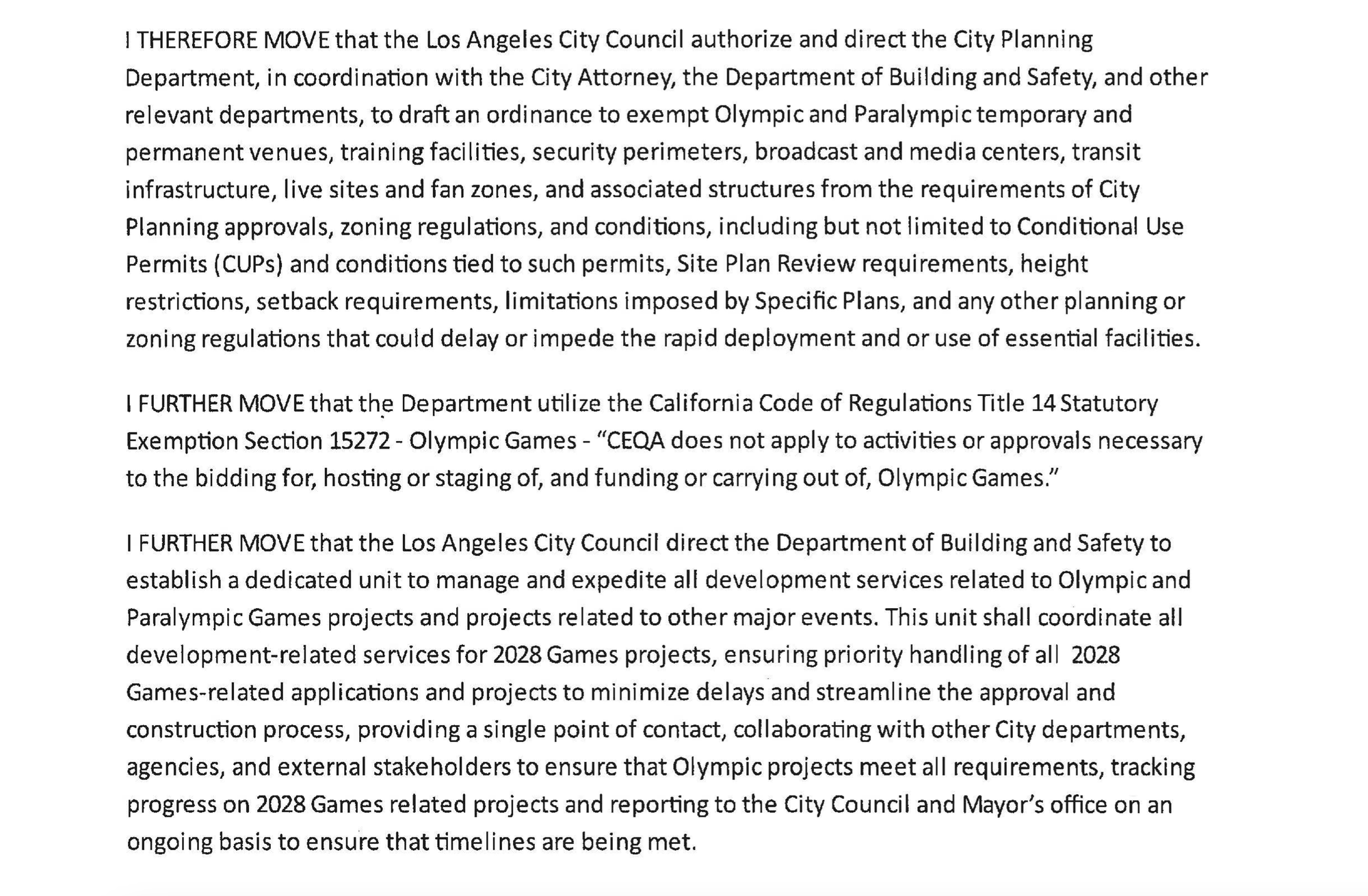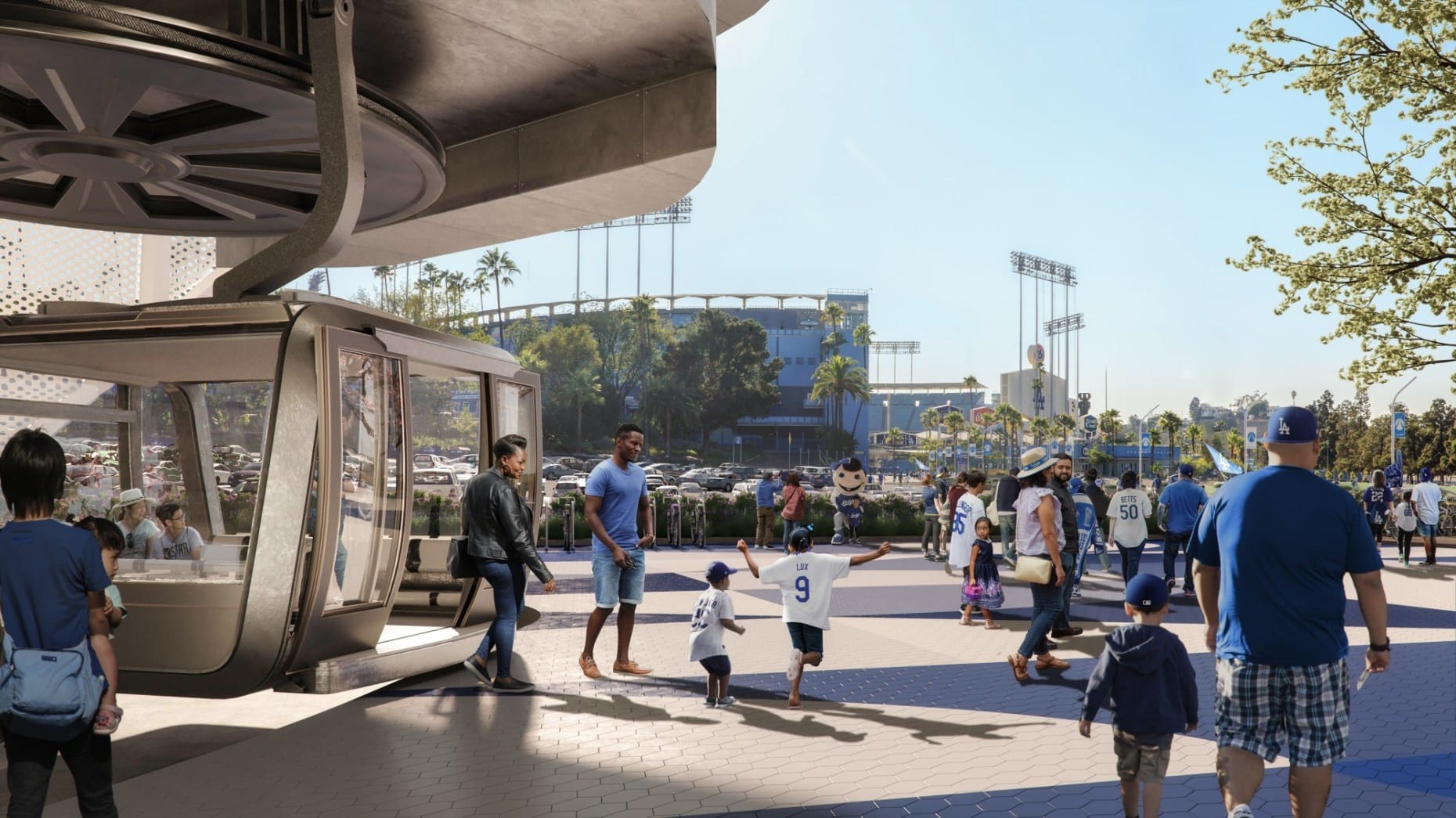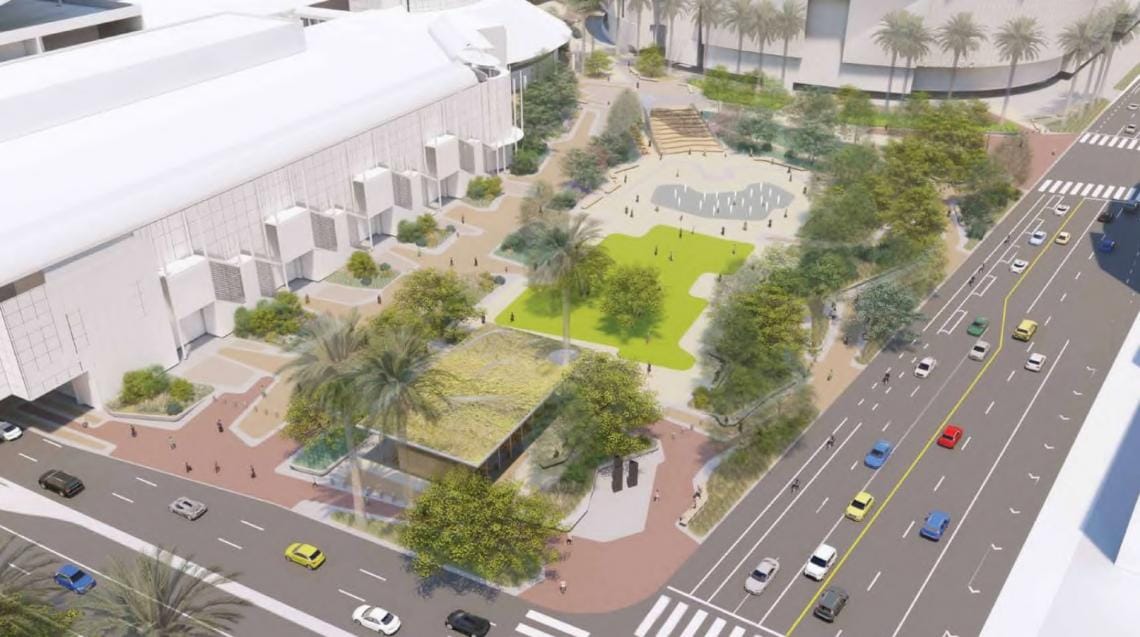Bump, set, spike
Santa Monica mounted a sustained, publicly transparent campaign to challenge what LA28 was offering. And, in the end, that's probably what sent the organizing committee packing for other shores
LA could leverage this ordinance to make it easier to create new public spaces, public bathrooms, and even public housing leading up to 2028

When you've appointed yourself the host of the "no-build" games, it would seem like the stance you've taken is pretty simple. You're not building anything for the games. And you certainly don't need help building anything for the games.
In the past, LA28 has tried to stifle the very suggestion. In 2017, California State Senator Steven Bradford proposed a bill that would exempt any Olympics-related transit projects from the public environmental review process dictated by the California Environmental Quality Act (aka our old friend CEQA). One week later, LA28 organizers asked Bradford to strip any mention of the Olympics from the bill: "While we appreciate any efforts to support the games," wrote former LA28 CEO Gene Sykes, "as the LA 2028 plan does not require building any new transit infrastructure, a CEQA exemption is unnecessary and we request that references to the Olympics be removed from the legislation as amended."
That bill died, but similar things keep happening. Six months ago, LA approved spending $54 million for a feasibility study to potentially expand the city's convention center before 2028, even though LA28 officials claimed no such expansion was needed to host Olympic events there.
And just last month, Metro's board sent a letter begging the Trump administration for $3 billion in transportation funding needed to pay for lots of transit infrastructure — despite the fact that we've been told, repeatedly, that LA28's plan does not require building any new transit infrastructure.
Now LA Councilmember Traci Park, chair of the ad hoc Olympic and Paralympic committee, has put forth a motion that confirms a construction boom is coming: "Many elements and activities of the 2028 Games will require building and developments, including but not limited to the buildout or improvements to temporary and permanent venues, training facilities, security perimeters, broadcast and media centers, transit infrastructure, live sites and fan zones, and associated structures."
But... you... said... okay, never mind.

It's obvious that LA28 will need to build a lot of temporary structures; officials have said the priciest thing on the list will be installing a new floor on the Coliseum for track and field, which is somehow even more expensive than turning SoFi into a pool. Will we have impermeable metal barricades around every venue like Paris where residents and small businesses required QR codes for access? And "associated structures" could be... anything?
Due to the opacity at the top, we have no idea what to expect as far as a community engagement process for these things. And what the motion is asking for sounds pretty dramatic: "exemptions for all Olympic and Paralympic temporary and permanent venues, training facilities, security perimeters, broadcast and media centers, transit infrastructure, live sites and fan zones, and associated structures from the requirements of City Planning approvals, zoning regulations, and permitting processes."

But as the motion itself notes, some of this was actually a done deal years ago.
Many Olympics-related approvals are already exempt from CEQA, per a 2005 statute: "CEQA does not apply to activities or approvals necessary to the bidding for, hosting or staging of, and funding or carrying out of, Olympic Games under the authority of the International Olympic Committee, except" — emphasis mine, because this last part is oddly not included in the city's motion — "for the construction of facilities necessary for such Olympic Games."
(For my CEQA-heads, those permanent projects do receive light streamlining: "If the facilities are required by the International Olympic Committee as a condition of being awarded the Olympic Games, the lead agency need not discuss the 'no project' alternative in an EIR with respect to those facilities.")
But just to reiterate: permanent Olympic facilities are not exempt from CEQA, but the city's motion, as written, specifically aims to exempt "temporary and permanent venues" — again emphasis mine.
Even if the city uses the CEQA exemption as a model for drafting this ordinance, it doesn't mean the city is going to be issuing blanket approvals for anything tangentially Olympics-related, says Florentina Craciun, a CEQA practitioner who patiently walked me through the legal implications. "When something is exempt from CEQA it doesn't mean that it's exempt from all the other regulations that are on the books that relate to environmental protection," she says. "You still have to comply with the building code. You still have to comply with OSHA regulations."
Yes, lawsuits regarding CEQA analysis can hold up a project — a moment of silence for the almighty Target Husk — but it's rarely the trickiest hoop to leap through. Basic municipal requirements like relocating utilities can be much worse — remember LA's public bathroom woes?

There is one project you might already have in mind that provides a very good example. The Dodger Stadium gondola filed its CEQA analysis last year. It was challenged in court by the LA Parks Alliance, and that challenge was struck down by a judge. "Gondola proponents may try to spin this as another shortcut for their project. It is not," says Jon Christensen, founder of the LA Parks Alliance, who says their appeal is in process and a trial could happen next year. "It does not exempt construction projects. And there is no way this project will be ready for the Olympics with all of the hurdles it still would have to cross." In fact, the project is currently seeking a plan amendment from California State Parks.
But CEQA also has a whole bunch of existing exemptions on the books in addition to Olympics-related ones: for certain types of housing, for "multi-benefit" megaprojects, and in 2021, much-needed CEQA reform added exemptions for some transportation projects, like bike lanes and bus lanes. Despite the fact that so many approvals are already exempt at the state level, this local ordinance was likely done as political cover, says Ethan Elkind, director of the climate program at UC Berkeley's Center for Law, Energy & the Environment. "If the lead agencies get any pushback" — and there's always pushback — "they can point to this." For transportation in particular, having a city ordinance that clearly spells it all out in one place can be useful for thwarting potential legal challenges. Anything to make Czar Paul Krekorian's new job installing dedicated bike and bus lanes all over the city a little easier, right?
On the other hand, CEQA exemptions have already been applied to some existing Olympic venues and the results have been decidedly not great! By proposing SoFi Stadium by ballot measure, Inglewood exploited a loophole that allowed the project to skirt the CEQA process. Intuit Dome ended up getting special CEQA streamlining despite predictions that traffic impacts would be grim — and we all know how well that's going. As LA plans a convention center expansion which would add even more parking to one of the most transit-rich parts of downtown, you'd hope the city would provide detailed environmental analysis to show the neighbors how the project might impact them.

But the motion isn't deferring all decisions to CEQA, it's creating its own set of laws for LA. If the city wanted to create a specific process for gondolas or convention centers or even bike lane approvals, the city could do that. Cities retain ministerial control over how state-level CEQA exemptions apply. "Local governments have their own discretion for how much they want to be governed by CEQA," says Elkind. "If LA wanted to, they could exempt all housing from CEQA tomorrow." YOU KNOW, JUST HYPOTHETICALLY.
On the contrary, LA could leverage this ordinance to make it easier to create new public spaces, public bathrooms, and even public housing leading up to 2028. LA leaders could make a law that quickly built dozens more "Olympic villages" all over the city which would get converted into social housing after the games. YOU KNOW, JUST HYPOTHETICALLY.
But this is where things could also get tricky. The motion would create a "dedicated unit to manage and expedite all development services related to Olympic and Paralympic Games projects and projects related to other major events" in the city's Department of Building and Safety. In some ways, this could be a blessing. Such an ordinance could help to streamline all the tiny municipal approvals that can get projects hung up in limbo forever; imagine trying to permit hundreds of pavilions for various activation sites under LA's current system. But I can also imagine tangentially related projects lobbying that department to be declared megaevent-essential. What's the process for determining games-worthiness? It opens the door up for all types of shenanigans, especially when those decisions will be made by one department, the Department of Building and Safety, which is, simply from a historical perspective, not our most ethically sound institution.
It's also a bad look (but also a very typical look) for the city to usher Olympics-related requests through streamlining while continuing to make it impossible to build anything else. All the people in the plan check queue forced to navigate a labyrinthine process for building ADUs will now watch as similar-sized structures for pop-up Nike merch stores are expedited ahead of them. As one architect told me: "LA city always throws the book at small homeowners, while they throw the book away for the rich and powerful." It's a real slap in the face to restaurants, where LA's outdoor dining program has created such monumental barriers that the city keeps having to extend the deadline. In an ideal situation, many of these same exemptions would be extended to a wide range of projects to create housing, public plazas, and small businesses, that, while not "for the Olympics," could help LA achieve its city goals for 2028. (That is, if LA had defined its city goals for 2028, which we still have not.)
But I have a feeling that's not necessarily what this motion is intended to do. Despite wanting to create lightning-fast, broadly defined approvals for "any other planning or zoning regulations that could delay or impede the rapid construction and deployment of essential facilities" that might serve megaevent organizers, Councilmember Traci Park introduced this motion on the very same day she declared a 120-unit supportive housing project in her district "dead" as city departments colluded to deny similar approvals that might serve the largest unsheltered homeless population in the country. 🔥